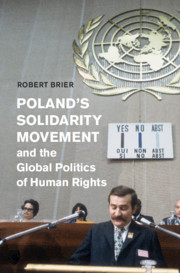Book contents
- Poland’s Solidarity Movement and the Global Politics of Human Rights
- Human Rights in History
- Poland’s Solidarity Movement and the Global Politics of Human Rights
- Copyright page
- Dedication
- Contents
- Acknowledgments
- Note on Geographical Regions
- Note on Cited Primary Documents
- Abbreviations
- Introduction
- 1 The Rise of Dissent in Poland
- 2 Dissent and the Politics of Human Rights
- 3 The Principle of Noninterference as Laid Down in the Helsinki Final Act
- 4 The End of the Ideological Age
- 5 Solidarity, Human Rights, and Anti-Totalitarianism in France
- 6 The “Bedrock of Human Rights”
- 7 Letters from Prison
- 8 Lech Wałęsa, the Symbolism of the Nobel Peace Prize, and Global Human Rights Culture
- 9 General Pinochecki
- 10 Human Rights and the End of the Cold War
- Epilogue
- Bibliography
- Index
7 - Letters from Prison
The Prisoner of Conscience and the Symbolic Politics of Human Rights
Published online by Cambridge University Press: 28 May 2021
- Poland’s Solidarity Movement and the Global Politics of Human Rights
- Human Rights in History
- Poland’s Solidarity Movement and the Global Politics of Human Rights
- Copyright page
- Dedication
- Contents
- Acknowledgments
- Note on Geographical Regions
- Note on Cited Primary Documents
- Abbreviations
- Introduction
- 1 The Rise of Dissent in Poland
- 2 Dissent and the Politics of Human Rights
- 3 The Principle of Noninterference as Laid Down in the Helsinki Final Act
- 4 The End of the Ideological Age
- 5 Solidarity, Human Rights, and Anti-Totalitarianism in France
- 6 The “Bedrock of Human Rights”
- 7 Letters from Prison
- 8 Lech Wałęsa, the Symbolism of the Nobel Peace Prize, and Global Human Rights Culture
- 9 General Pinochecki
- 10 Human Rights and the End of the Cold War
- Epilogue
- Bibliography
- Index
Summary
This chapter analyzes how political prisoners in 1980s Poland sought to put their plight on the agenda of East–West relations. In so doing, this chapter reconstructs a central symbol of 1980s global human rights culture: the prisoner of conscience. The prisoner of conscience, the chapter shows, was the result of how Amnesty International had reimagined the struggle against political incarceration. In the past, this struggle had been driven by solidarity with political prisoners' specific ideology; Amnesty's activism, in contrast, centered on empathy with the plight of suffering individuals who tried to defend their very humanity against an all-powerful state. By drawing on this discourse and the social practices associated with it, especially hunger strikes, the Polish prisoners managed to turn themselves into icons of human rights culture, quasi-sacred images of the international community's most hallowed values. Yet this process also divorced the prisoners from the specific political aims they were struggling for, allowing powerful international actors to project their own views onto them. For all its antipolitical imagery, the chapter shows, the “prisoner of conscience” was part of a symbolic politics of human rights.
Keywords
- Type
- Chapter
- Information
- Publisher: Cambridge University PressPrint publication year: 2021



